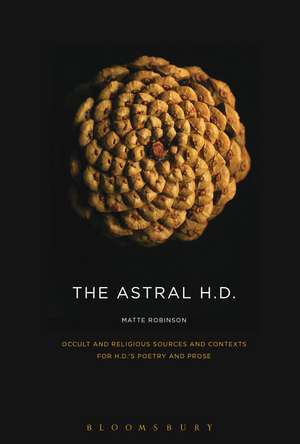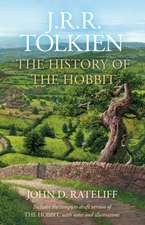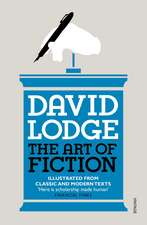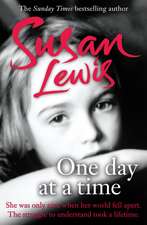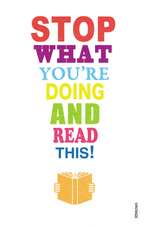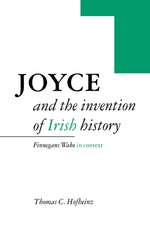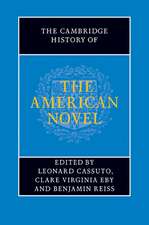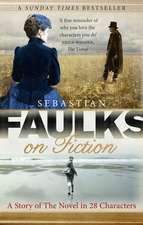The Astral H.D.: Occult and Religious Sources and Contexts for H.D.’s Poetry and Prose
Autor Dr. Matte Robinsonen Limba Engleză Paperback – 23 aug 2017
| Toate formatele și edițiile | Preț | Express |
|---|---|---|
| Paperback (1) | 256.29 lei 6-8 săpt. | |
| Bloomsbury Publishing – 23 aug 2017 | 256.29 lei 6-8 săpt. | |
| Hardback (1) | 714.12 lei 6-8 săpt. | |
| Bloomsbury Publishing – 23 mar 2016 | 714.12 lei 6-8 săpt. |
Preț: 256.29 lei
Nou
Puncte Express: 384
Preț estimativ în valută:
49.04€ • 51.37$ • 40.64£
49.04€ • 51.37$ • 40.64£
Carte tipărită la comandă
Livrare economică 08-22 aprilie
Preluare comenzi: 021 569.72.76
Specificații
ISBN-13: 9781501335839
ISBN-10: 1501335839
Pagini: 216
Dimensiuni: 233 x 154 x 18 mm
Greutate: 0.3 kg
Ediția:NIPPOD
Editura: Bloomsbury Publishing
Colecția Bloomsbury Academic
Locul publicării:New York, United States
ISBN-10: 1501335839
Pagini: 216
Dimensiuni: 233 x 154 x 18 mm
Greutate: 0.3 kg
Ediția:NIPPOD
Editura: Bloomsbury Publishing
Colecția Bloomsbury Academic
Locul publicării:New York, United States
Caracteristici
A guide to many key themes and symbols in H.D.'s major works, based on the evidence of H.D.'s own notes
Notă biografică
Matte Robinson is Assistant Professor of English at St. Thomas University, Fredericton, Canada.
Cuprins
Introduction: H.D.'s Occult EducationChapter 1: "Blasted into consciousness": Majic Ring, Trilogy, Amen, and the Air MarshallChapter 2: Dans L'ombre Des Cathedrales: Other Bodies, Other InitiationsChapter 3: Adam Dieu Rouge, Vale Ave, and the Luciferian MethodChapter 4: La Kabbale Pratique and the Great OperationChapter 5: Synthesis and ConclusionsBibliography Index
Recenzii
The Astral H.D. offers a welcome account of H.D.'s relationship to the complexities of the occult tradition, and sheds light in to some of the darker regions of the poet's personal archive. It includes historical and literary material that is important for scholars engaging with the wider ranging questions occasioned by the study of modernism and religious culture.
An excellent guide to H.D.'s occultism: her reading, her associative processing of that reading, and her appropriation and adaptation of it in her later poetry . This book is extraordinarily well-researched, meticulous, and thorough. It is a challenge to read, purely because of the breadth and scope of H.D.'s reading in the occult, but Robinson has full control of this mass of material.
An important and useful addition to the scholarship on H.D.'s involvement in spiritualism and the occult.
The Astral H.D. will inspire new critical assessments of H.D.'s great war epic, Trilogy, as well as some of her lesser known poetry, such as Vale Ave and the poems of Hermetic Definition. Robinson's grasp on the occult literature H.D. was reading in her later years is impressive, and he illuminates beautifully some of the more esoteric source material of her extensive library.
In The Astral H.D., Robinson undertakes a fascinating investigation into the myriad complexities of H.D.'s engagement with the occult. Robinson's thorough and erudite scholarship marshals a wealth of archival research and provides deft readings of H.D.'s most challenging texts. An invaluable resource for H.D. scholars, this volume will also be essential reading for all those interested in how an accomplished writer might appropriate, adapt and deploy a complex constellation of hermetic images and ideas.
Positioned as a supplement to Susan Stanford Friedman's Psyche Reborn (1981), this book focuses on H.D.'s late long poems, particularly the spiritual and esoteric texts that influenced her in her last decade of writing. Tracing her marginalia in these books, Robinson asserts that occultism not only inspired her poetry but also offered her a framework to think about her life events, "allowing for an extensive project of weaving together her memories, dreams, visions, fantasies, and future." By locating the sources of H.D.'s gnosticism, hermeticism, and Rosicrucianism, this book provides detailed readings of Trilogy (1973), Helen in Egypt (1961), and Hermetic Definition (1971).
The Astral H. D. is a deft work that manages to both broadly survey the esoteric material that informed H. D.'s spiritual questing-what she termed her "work or her researches"-and acutely place this work in the context of her writing (p. 23). Robinson's approach to this material is detailed and multifaceted. Employing historical, biographical, and critical methodologies, he draws his analysis from a range of material including archival sources, such as the writer's notebooks and marginalia from her original copies of occult books. He also turns to the writings of the key occult figures to whom she was drawn (for example, Yogi Ramacharaka, Jean Chaboseau, and Robert Ambelain). While most H. D. scholars will be aware of the poet's interest in the occult, they may be surprised to learn of the intricacies of H. D.'s research. The reader of The Astral H. D. should expect to gain significant knowledge of key concepts, terms, symbology, and critical debates within the occult sources that were most important to the poet. While this material is challenging for anyone who is not well-versed in occult practices and teachings, Robinson addresses it with care and precision. Complex ideas are made especially accessible when placed in direct conversation with prominent themes in H. D.'s literature . It is the nuanced and detailed nature of Robinson's study that truly marks this book's contribution to the field.
An excellent guide to H.D.'s occultism: her reading, her associative processing of that reading, and her appropriation and adaptation of it in her later poetry . This book is extraordinarily well-researched, meticulous, and thorough. It is a challenge to read, purely because of the breadth and scope of H.D.'s reading in the occult, but Robinson has full control of this mass of material.
An important and useful addition to the scholarship on H.D.'s involvement in spiritualism and the occult.
The Astral H.D. will inspire new critical assessments of H.D.'s great war epic, Trilogy, as well as some of her lesser known poetry, such as Vale Ave and the poems of Hermetic Definition. Robinson's grasp on the occult literature H.D. was reading in her later years is impressive, and he illuminates beautifully some of the more esoteric source material of her extensive library.
In The Astral H.D., Robinson undertakes a fascinating investigation into the myriad complexities of H.D.'s engagement with the occult. Robinson's thorough and erudite scholarship marshals a wealth of archival research and provides deft readings of H.D.'s most challenging texts. An invaluable resource for H.D. scholars, this volume will also be essential reading for all those interested in how an accomplished writer might appropriate, adapt and deploy a complex constellation of hermetic images and ideas.
Positioned as a supplement to Susan Stanford Friedman's Psyche Reborn (1981), this book focuses on H.D.'s late long poems, particularly the spiritual and esoteric texts that influenced her in her last decade of writing. Tracing her marginalia in these books, Robinson asserts that occultism not only inspired her poetry but also offered her a framework to think about her life events, "allowing for an extensive project of weaving together her memories, dreams, visions, fantasies, and future." By locating the sources of H.D.'s gnosticism, hermeticism, and Rosicrucianism, this book provides detailed readings of Trilogy (1973), Helen in Egypt (1961), and Hermetic Definition (1971).
The Astral H. D. is a deft work that manages to both broadly survey the esoteric material that informed H. D.'s spiritual questing-what she termed her "work or her researches"-and acutely place this work in the context of her writing (p. 23). Robinson's approach to this material is detailed and multifaceted. Employing historical, biographical, and critical methodologies, he draws his analysis from a range of material including archival sources, such as the writer's notebooks and marginalia from her original copies of occult books. He also turns to the writings of the key occult figures to whom she was drawn (for example, Yogi Ramacharaka, Jean Chaboseau, and Robert Ambelain). While most H. D. scholars will be aware of the poet's interest in the occult, they may be surprised to learn of the intricacies of H. D.'s research. The reader of The Astral H. D. should expect to gain significant knowledge of key concepts, terms, symbology, and critical debates within the occult sources that were most important to the poet. While this material is challenging for anyone who is not well-versed in occult practices and teachings, Robinson addresses it with care and precision. Complex ideas are made especially accessible when placed in direct conversation with prominent themes in H. D.'s literature . It is the nuanced and detailed nature of Robinson's study that truly marks this book's contribution to the field.
